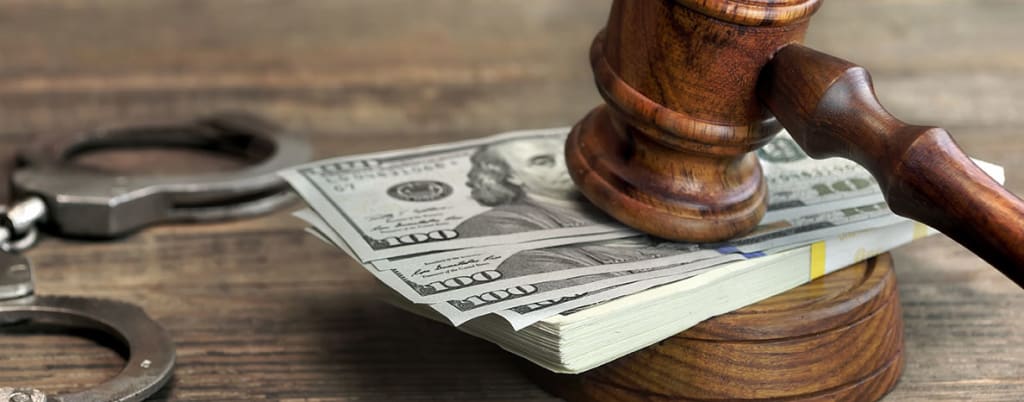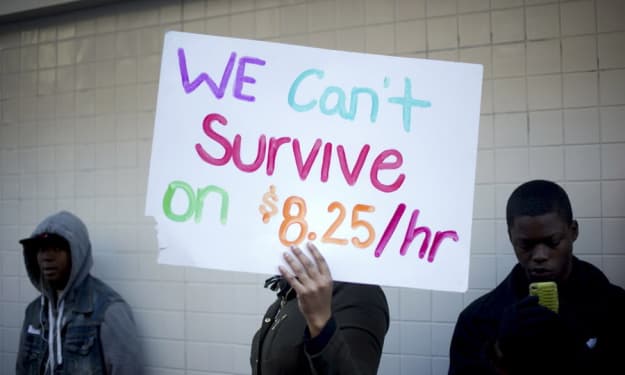Eliminating Bail
Bail favors the rich, enriches illegal practices and useless businesses, and does extremely little to fix crime.

Bail is when money is given to the court so a defendant can leave jail until their trial; it's also a promise that the defendant will show up for that trial. But if a defendant cannot afford a thousand dollar bail, guilty or not, they’re stuck in jail until their trial. America needs to remove the bail system. Bail does extreme harm and very little to no good.
Bail overwhelmingly favors the rich over the poor, and if someone's too poor to pay bail, guilty of or not, they are stuck in jail until their trial. Whereas if somebody can afford bail, guilty or not, they are out until their trial. Listen to the story of Kalief Browder, a poor young teenager, who was arrested for allegedly stealing a backpack at the age of 16. “Browder was arrested at the age of 16 for allegedly stealing a backpack. He was unable to pay bail and remained in jail for three years—in solitary confinement for most of that time—until he committed suicide. Browder's story is not unique. Americans across the nation are arrested and unable to make bail, so they stay in jail until their court date.” (Tylt, "Should The US Abolish The Bail System.") If someone can't afford bail, they can plead guilty even if they're not, whether they've committed a crime or not they are a criminal, and they can't do much with a criminal conviction. They can't volunteer, get jobs in the medical field, or as a teacher, or a police officer, and it's also tough to find somewhere to live or get insurance. (Paul Bonders: "11 Things You Can't-Do With a Criminal Record.") Also, almost all essential applications have a section asking if you've been convicted of a crime, if you plead guilty, you must say yes, this will almost always disqualify you from that job, apartment, house, or whatever that application was for. Having to plead guilty to a crime just to get out of jail can ruin someone's life either instantly or years after the fact.
If the defendant can't afford bail and doesn't want to ruin their life by blindly pleading guilty, they can hire a bail bondsman. A bail bondsman is a person who pays your full bail and charges you a 10-15% fee in exchange for a promise you will show up for your trial. For example, if you used a bondsman to make bail and you're found innocent, that fee was a waste. If bail is $5000, the bondsman directly pays that full amount to the court, the defendant would only have to pay the bondsmen $750, that they keep regardless of the outcome of your trial. (John Oliver, Last Week Tonight; "Bail.") If somebody used a bondsman and didn't show up at their trial for some reason, bondsmen can hire bounty hunters to hunt them down. For people who hunt down alleged criminals, bounty hunters can do illegal things to find somebody; stuff like breaking and entering and assault. Bounty hunters have very little oversight or regulation including in who can become a bounty hunter. They're virtually unregulated police. Bail bondsmen are a scam, and the practice of bounty hunters is unnecessary and scary. These elements of the bail system need to be eliminated, and the people and companies who participated in them need to face punishment; fines, jail time, something, especially bounty hunters; they are criminals and need to be treated as such.
Washington D.C and New Jersey are great examples of why eliminating bail is a good thing. In D.C they have a law saying a judge is only allowed to set bail if the defendant can afford it. “We are the only city in America where tonight at our jail there is not a single man or woman who is sitting because they don't have the money to meet their money bond (bail).” (John Oliver, Last Week Tonight; "Bail.") That should not be considered bragging. On the 1st day of 2017, New Jersey eliminated bail, in 6 months their jail population decreased 20%, from 7,173 in January to 5,717 June 1st. (Rebecca Everett; "Here's how N.J. scores on bail reform (Hint: it's better than other states).") Decreasing jail populations will minimize the cost to run local jails, and increase the amount of working, tax-paying citizens. It will be an all-around win for America's economy and public image.
In 2016 61.1% of Americans think we should keep bail and “stay tough on crime” from Tylt: "Should The US Abolish The Bail System" and keep bail but bail does not stop crime or is a severe punishment for crime; it's punishment for being poor. Robert Durst, a millionaire, was accused of murder and his story says everything about how much bail favors the rich “I was told by the detective you've been charged with murder, bail has been set at $250,000.” “Goodbye $250,000, goodbye jail, I'm out.” (John Oliver, Last Week Tonight; "Bail.") He paid the court $250,000 and was released. He wasn't released because he was innocent or he was evaluated; it's because he paid, proving once again that bail just gives rich people a pass. Bail is not being tough on crime; it's soft on the rich.
We need a solution instead of bail; we need free trial services. With free trial services, defendants are assessed by five things: the seriousness of the crime, the circumstance of the crime, the defendant's adult criminal history, the likeliness of the defendant to re-offend, and likeliness to show up for their trial. It also subjects all defendants to random drug tests. If we implement this system, we would not be jailing people for their inability to pay a thousand dollar bail, and we would not be releasing them for their ability just for their ability to pay that thousand dollar bail. New Jersey and DC implemented a system like this, look how it has benefited their citizens. Free trial services are a tremendous and comprehensive alternative to bail.
Bail favors the wealthy, field toxic businesses (bondsman) and practices (bounty hunters) and does nothing to lower crime. Right now abolishing bail is not the most pressing issue in Washington not by a long shot, but it's essential. Keep an eye out for legislation relating to bail and contact your representatives telling them how harmful bail is and that they should do something.You can also find and support organizations that fight and support ending bail, you can educate yourself even more on the harm of the bail system and the stories of people negatively affected by it, or you could directly express your opinion and maybe help educate others when the topic of bail is brought up in conversation. Ending bail is only going to be good whether we do it soon or in 2 years. Support the ending of bail in any way you can.






Comments
There are no comments for this story
Be the first to respond and start the conversation.